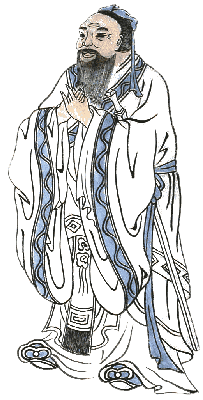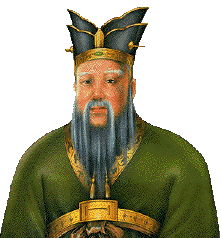

[K'ung-fu-tzu or Kongfuzi]


The Book of Analects (Lun Yu) contains the sayings of Confucius and present his ethical principles. The following are just some of the sayings:
Only the supremely wise and the abysmally ignorant do not change.
Men of superior mind busy themselves first getting at the root of things; when they succeed, the right course is open to them.
One excellent way to practice the rules of propriety is to be natural.
When truth and right go hand in hand, a statement will bear repetition.
Sorrow not because men do not know you; but sorrow that you do not know men.
To govern simply by statute and to maintain order by means of penalties is to render the people evasive and devoid of a sense of shame.
If you observe what people take into their hands, observe the motives, note what gives them satisfaction; then will they be able to conceal from you what they are?
When you know a thing, maintain you know it; when you do not, acknowledge it. This is the characteristic of knowledge.
Let The leader of men promote those who have ability, and instruct those who have it not, and they will be willing to be led.
To see what is right and not to do it, that is cowardice.
The superior man is not contentious. He contends only as in competitions of archery; and when he wins he will present his cup to his competitor.
A man without charity in his heart, what has he to do with ceremonies? A man without charity in his heart, what has he to do with music?
He who has sinned against Heaven has none other to whom his prayer may be addressed.
Tell me, is there anyone who is able for one whole day to apply the energy of his mind to virtue? It may be that there are such, but I have never met with one.
If we may learn what is right in the morning, we should be content to die in the evening.
The scholar who is intent upon learning the truth, yet is ashamed of his poor clothes and food, is not worthy to be discoursed with.
It is as hard to be poor without complaining as to be rich without becoming arrogant.
The superior men are sparing in their words and profuse in their deeds.
My great concern is not with men who do not know me, but with men who cannot understand me.
Confucius was asked, "What say you of the remark, 'Repay enmity with kindness'?" And he replied, "How then would you repay kindness? Repay kindness with kindness, and enmity with justice."
Not to teach a man who can be taught, is to waste a man; to teach
a man who cannot be taught, is a waste of words. The wise will lose neither men nor words.
words. The wise will lose neither men nor words.
A workman who wants to do his work well must first prepare his tools.
I have not yet met the man who loves virtue as he loves beauty.
Confucius was asked, "Is there one word that sums up the basis of all good conduct?" And he replied, "Is not 'reciprocity' that word? What you yourself do not desire do not put before others."
Not to react after committing an error is in itself an error.
The superior man may not be conversant with petty details, yet can be entrusted with important matters; the inferior man may be conversant with petty details yet cannot be entrusted with important matters.
Three things the superior man guards against: lust of the flesh in youth, combativeness in maturity, and ambition in old age.
Does Heaven ever speak? The four seasons come and go, and all creatures thrive and grow. Does Heaven ever speak!
What harm can a man do to the sun or the moon by wishing to stop either in its course? It only shows that he knows not his own limitations.
Confucius was asked, "What say you are the essentials of good government?" He answered, "The ruler should esteem the five excellences and avoid the four evils. The five excellences are: plenitude without extravagance; taxation without exciting discontent; desire without covetousness; dignity without haughtiness; majesty without fierceness. The four evils to be avoided are: without instruction in the law, to inflict punishment - that is tyranny; without proper warning to expect perfect adherence - that is oppression; late in giving orders and expecting early obedience - that is robbery; to tax and to spend in a stingy manner - that is a misuse of government function."
He who does not recognize the existence of a Divine Law cannot be a superior man.
The Man Wisdom Analects Maxims Home